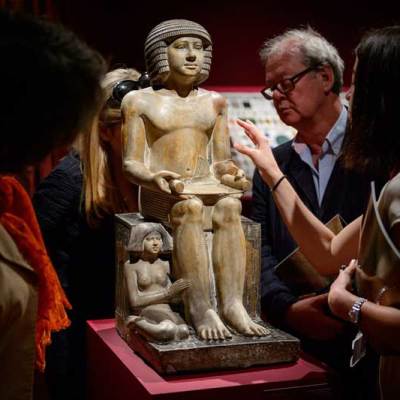The Arts Council has revoked its accreditation of two Northampton museums following the controversial sale of an ancient Egyptian statue last month.
The Sekhemka statue, which dates from around 2400–2300 BC and depicts an inspector of the royal scribes, was sold by Northampton Borough Council at Christie’s on 10 July. Billed by the auction house as ‘the most important Egyptian sculpture ever to come to market’, it was bought for close to £16 million by a private collector.
Northampton will use the proceeds to pay for an extension to the Northampton Museum and Art Gallery and the refurbishment of the nearby Abington Park Museum. But the removal of the museums’ accredited status will make them ineligible for certain grants and loans for at least five years.
This has quickly become something of a case study in the ethical and legal issues surrounding deaccession. The announcement of the sale met with widespread opposition. The Egyptian ambassador to Britain called it ‘an abuse of the Egyptian archaeology’. ICOM suggested that such a high-profile sale could encourage illicit trade in similar artefacts. Alan Moore, the comic book writer famous for The League of Extraordinary Gentlemen, suggested that he would not donate again to his local museum if it treated its collections as disposable assets.
There are strict guidelines in place regarding the disposal of cultural objects, which were specifically amended recently to clarify the best procedure in financially motivated cases. They tend to promote the protection of museums’ core collections over comparatively short-term projects, yet David Mackintosh, the leader of Northampton Borough Council, insists that his team were acting in the museums’ best interests. Despite expressions of concern from the Arts Council before the sale, he has called their subsequent decision to remove accreditation ‘puzzling’ given that his is ‘possibly one of the only local authorities in the country with plans for a multi-million pound investment in their museum service’.
What’s next for Northampton? Mackintosh himself is talking down the decision, suggesting that they can (and always intended to) find additional funding for their development plans elsewhere. The ‘Save Sekhemka’ action group, meanwhile, has raised concerns that other objects in the museum collections could now be sold without any further repercussions for the borough council.
Do you think deaccession is ever justified? And how might it be managed as museums come under increasing financial pressure? Let us know your thoughts in the comments…
See also:
The Apollo Podcast: July/August (listen for a discussion of the Sekhemka Sale)
Forum: Deaccession Debates (Maggie Gray)



